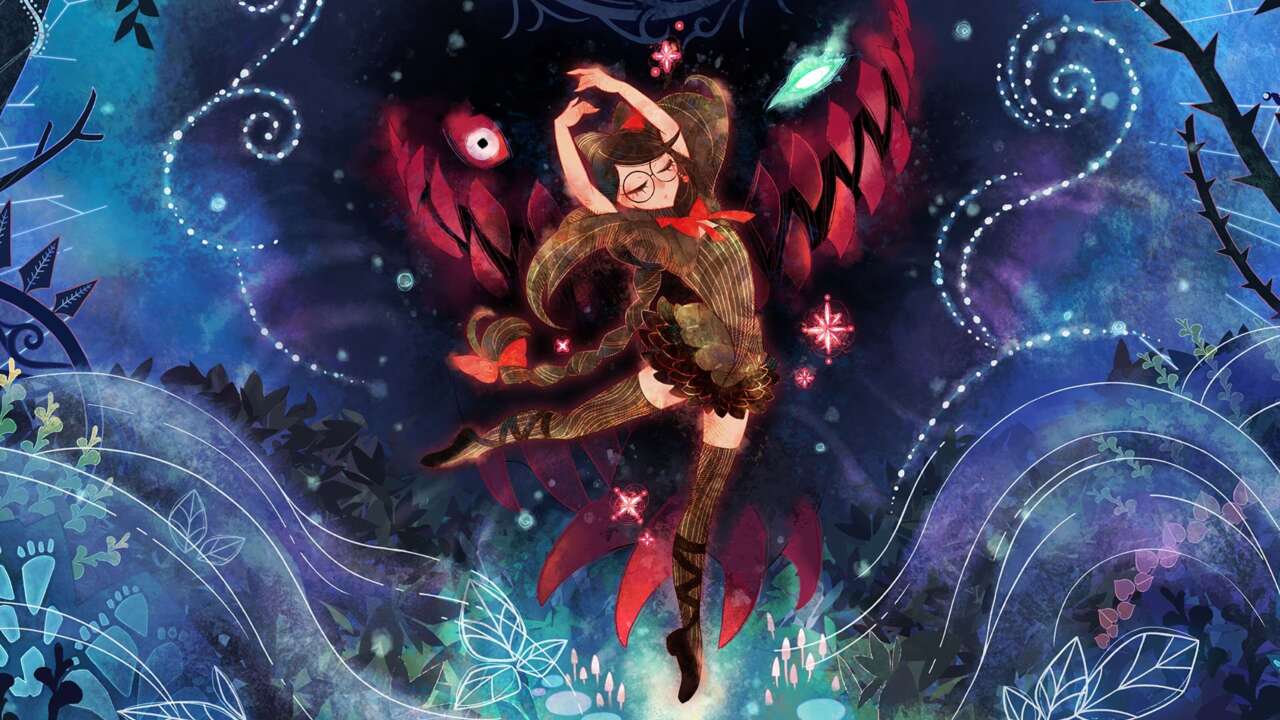Bayonetta Origins: Cereza And The Lost Demon – Malice In Wonderland
The difference in direction between the Bayonetta trilogy and the newest entry in the series, Bayonetta Origins: Cereza and The Lost Demon, is impossible to ignore. In place of the self-assured dominatrix we know and love is a timid young girl who is far more comfortable clutching a stuffed animal than she is a pistol. Instead of large-scale, action-packed set pieces and the mainline series’ unapologetically over-the-top style, we are treated to enchanted forests, well-worn book pages adorned with soft illustrations, and gentle, childlike curiosity. As such, the first few hours I spent with Bayonetta Origins were filled with complete and utter confusion. I couldn’t find the connection between Bayonetta Origins and the Bayonetta trilogy, or the threads that connected the two experiences to one another. But thankfully, the team behind Bayonetta Origins could.
Bayonetta Origins is an achievement, both within the Bayonetta series and games as a whole. It is proof the rules and limitations placed on certain, big budget series are made to be broken–especially when you can do it with this much creativity and tact. The charming adventure-puzzler is also just delightful to play, and is far more than what it appears on the surface. As its story unfolds, it slowly builds into a recognizably Bayonetta game–one filled with excitement, darkness, subversions, and feminine liberation–all while maintaining an identity all its own. All this combined with a touching tale of companionship and maternal love–that may or may not have made me cry a lot–makes for a game I urge you not to overlook whether or not you’re a fan of the Bayonetta games.
Set long before Cereza steps into the souped-up shoes of Bayonetta, Origins is best described as a “coming-of-half-lumen-sage” story. After witnessing her mother’s imprisonment due to a forbidden romance with Cereza’s father, the young girl is forced to seek refuge under the tutelage of a powerful witch who lives on the outskirts of the forbidden Avalon forest. Her teacher is firm-yet-kind–clearly intended to show in part where Bayonetta’s cool demeanor comes from–but is often frustrated by Cereza’s cowardice. As such, when a spirit visits Cereza and tells her that the courage she needs to become a proper witch and rescue her mother lies deep in Avalon, the young witch quickly sets off in search of it.
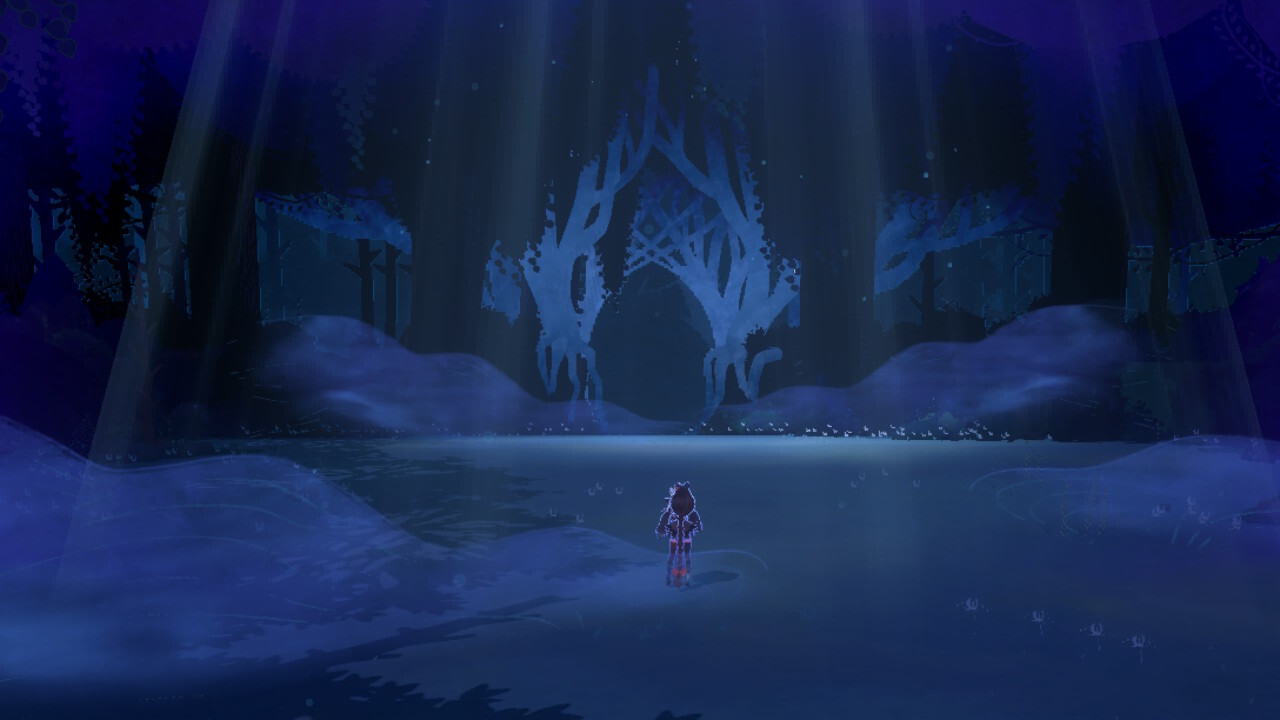
In Bayonetta Origins, you control both Cereza and Cheshire simultaneously, with all of Cereza’s controls assigned to the left JoyCon while all of Cheshire’s are located on the right. Similar to any Hazelight production (It Takes Two, A Way Out, Brothers: A Tale Of Two Sons), the game is filled with asymmetrical puzzles that require you to explore your environment and use both characters’ various talents to progress. For Cereza, this means using her magic to bring helpful plants to life and stun enemies, as well as taking advantage of her small frame to cross vines. Cheshire, on the other hand, utilizes his brute strength, large size, and elemental powers he slowly unlocks to blaze ahead. When Cheshire can’t cross a particular area, Cereza steps in to create a path. When Cereza can’t reach a high ledge, Cheshire allows himself to shrink down into his stuffed animal form and be tossed to the once inaccessible ledge. While not particularly difficult, the puzzles are well-balanced, interesting, and continuously build in small ways, properly preparing you for what line of thinking the next obstacle might require.
With this style of gameplay and the nature of the controls, there were a few instances where I felt my wires get a bit crossed and I’d accidentally move Cheshire rather than Cereza or vice versa. Thankfully the consequences for this are never dire and I found that as I progressed these mix ups happened less and less. Considering all the actions you can take as both members of the demonic duo–the game’s skill tree is quite dense–the mapping is actually incredibly intuitive, and makes for the smoothest and most exciting single-button combat I’ve seen executed in a game.
A large reason why the game’s combat is as satisfying as it is is because of how the puzzle aspect of the game also extends to your encounters. The vast majority of enemies you square off against require either Cheshire’s elemental abilities or Cereza’s magic–which takes shape as a sort of small-scale rhythm game–to make them vulnerable to attack. This makes battles–and particularly the challenging Tir na nOgs stages, which feel somewhat like more combat-oriented Breath of the Wild shrines–require quick thinking and careful coordination on the players’ part. To make matters more exciting, as enemy types and the number of waves you face off against expand, so does the feeling that you truly are playing an action-packed Bayonetta game–albeit very different from what’s come before.
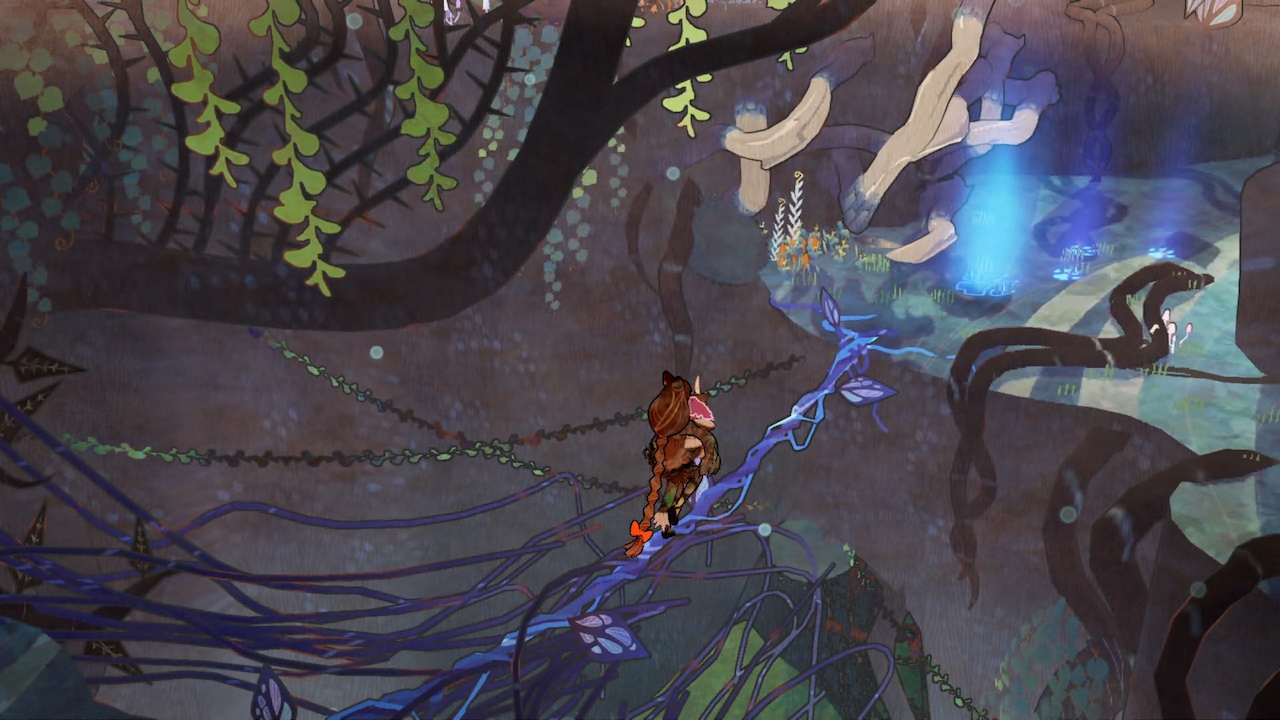
That said, players might find that Bayonetta Origins’ combat is where the aforementioned crossed wires problem tends to happen the most–and is the most frustrating. While I found the technique of frequently recalling Cheshire in order to narrow my attention to one character to control, the bulk of the time you need to be playing as both, which can result in some fairly inelegant gameplay at times. Additionally, this complexity can feel a bit at odds with the light-hearted and inviting nature of the game. Though the game’s story and world make this an easy recommendation for younger players, the controls could make the experience a bit of a struggle.
This feeling continues to grow the further you progress in the game. While I won’t delve into spoiler territory–frankly the game’s story and callbacks are too special to want to ruin them–it impressed me how much Bayonetta Origins begins in one place and lightly dances towards another we are more familiar with. Thankfully, however, crossing this bridge does not correlate to a change in tone. I was worried as Cereza grew more competent and confident the game might force sexuality on the young girl and rob the game of its childlike wonder. I can assure you it does not, but rather allows Cereza to be a child discovering her strength and confidence in different ways before delving into the world of guns and leather.
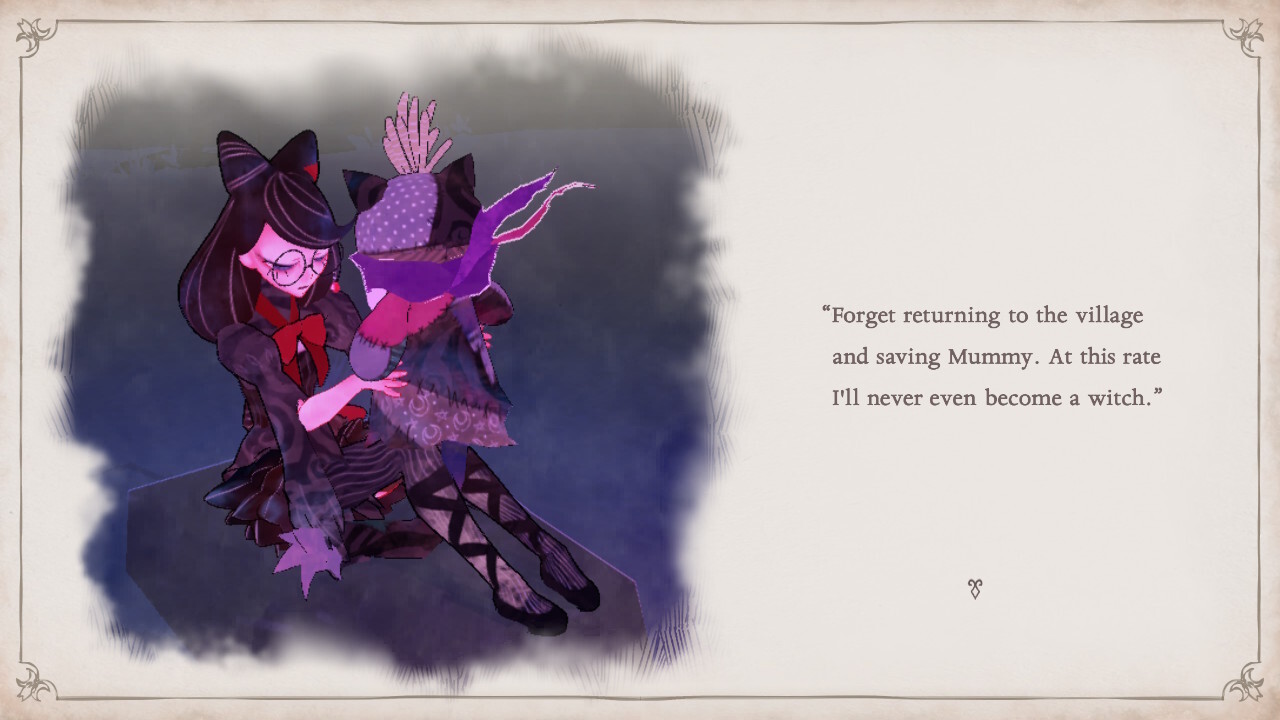
And aside from the sheer inappropriateness that would have accompanied that tonal shift, Bayonetta Origins is so charming I didn’t want to watch it contort itself into something more familiar–I wanted to savor every second of this game that felt too unique to exist as a part of the Bayonetta series. And sure, there are aspects that overlap and portions of the game that connect Bayonetta Origins to the mainline trilogy in necessary ways, but its focus, direction, and the confidence it exudes in both, never change.
Though previous Bayonetta games also divided their narratives into chapters, the chapters in Bayonetta Origins are far more literal, as the story is told as if it is a children’s book. A tender, matronly woman narrates the tale, adding in unique voices for certain characters, such as the ever-grumpy Cheshire, while illustrations fade in and out on the weathered pages. The game as a whole has a whimsical, painterly quality to it that perfectly suits its sense of wonder, and uses color and camera angles to create spectacles that add a bit of grandeur and magic to the intimate experience. Though the Nintendo Switch might not be able to keep up with its fellow current gen consoles graphically, Bayonetta Origins is a great example of how developers can combat that by focusing on artistry rather than fidelity. It is important to note, though, that the game’s more free-flowing art style looks much sharper in portable mode.
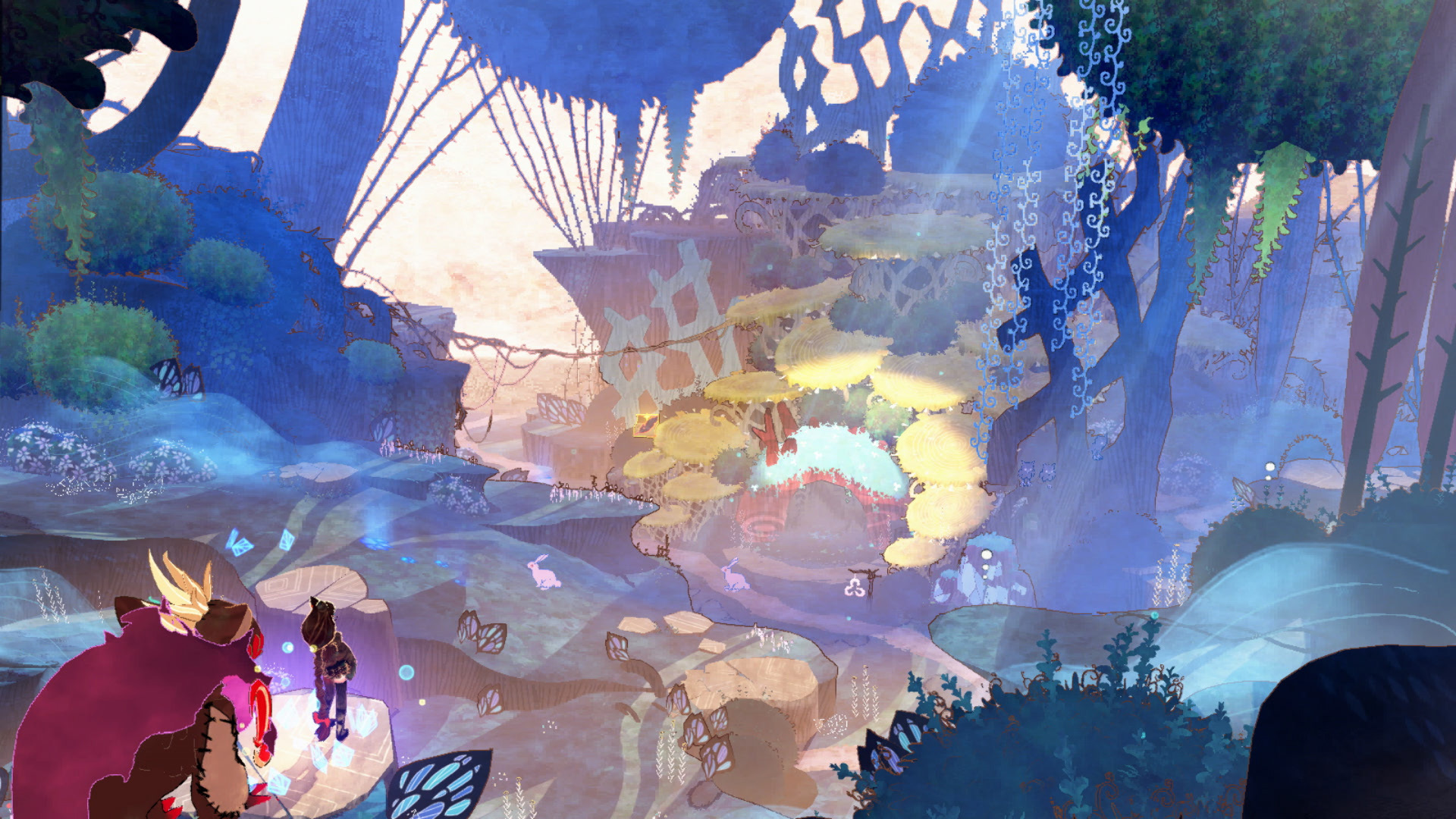
However, all of this pales into how sweet and affecting the Bayonetta Origins narrative is. For years now, the games industry has called for games to showcase motherhood, and this game is absolutely Platinum Games’ triumphant attempt to satiate that need. Additionally, Cereza is every bit as charismatic as the older version of herself in this game. Her lines are delivered with sincerity, youthful joy, and emotion, and her moral compass and strength make her easy to love. Both Cereza and Cheshire bounce between cheeky and reluctantly compassionate with ease and pure adorableness, and it makes for a delightful dynamic that evolves into a truly special relationship. While some folks who raised eyes at Bayonetta 3’s story might be wary at the direction Bayonetta Origins seems to be going in at its start, hang in there–you’ll be pleasantly surprised.
Bayonetta Origins: Cereza and The Lost Demon is a testament to thinking outside the box. While I don’t suspect Platinum Games will pivot to this new style of gameplay and storytelling in future Bayonetta games in the same way Breath of the Wild or God of War (2018) shifted the direction of their respective franchises, I cannot help but be thankful that the studio trusted the vision of its team enough to create this experience. Though with how fantastic every aspect of the game is, I understand why the developer did.
For all the latest Games News Click Here
For the latest news and updates, follow us on Google News.

